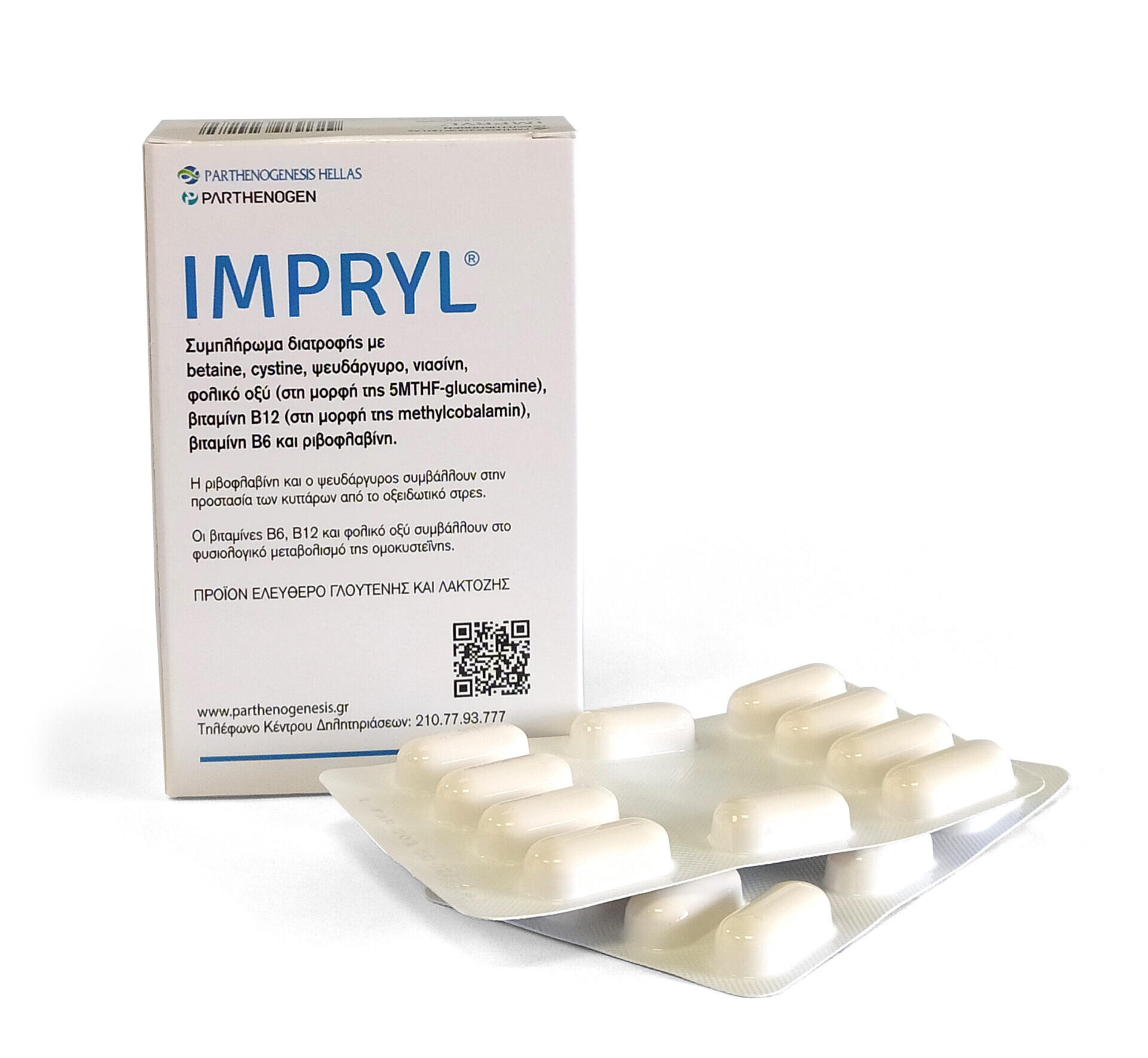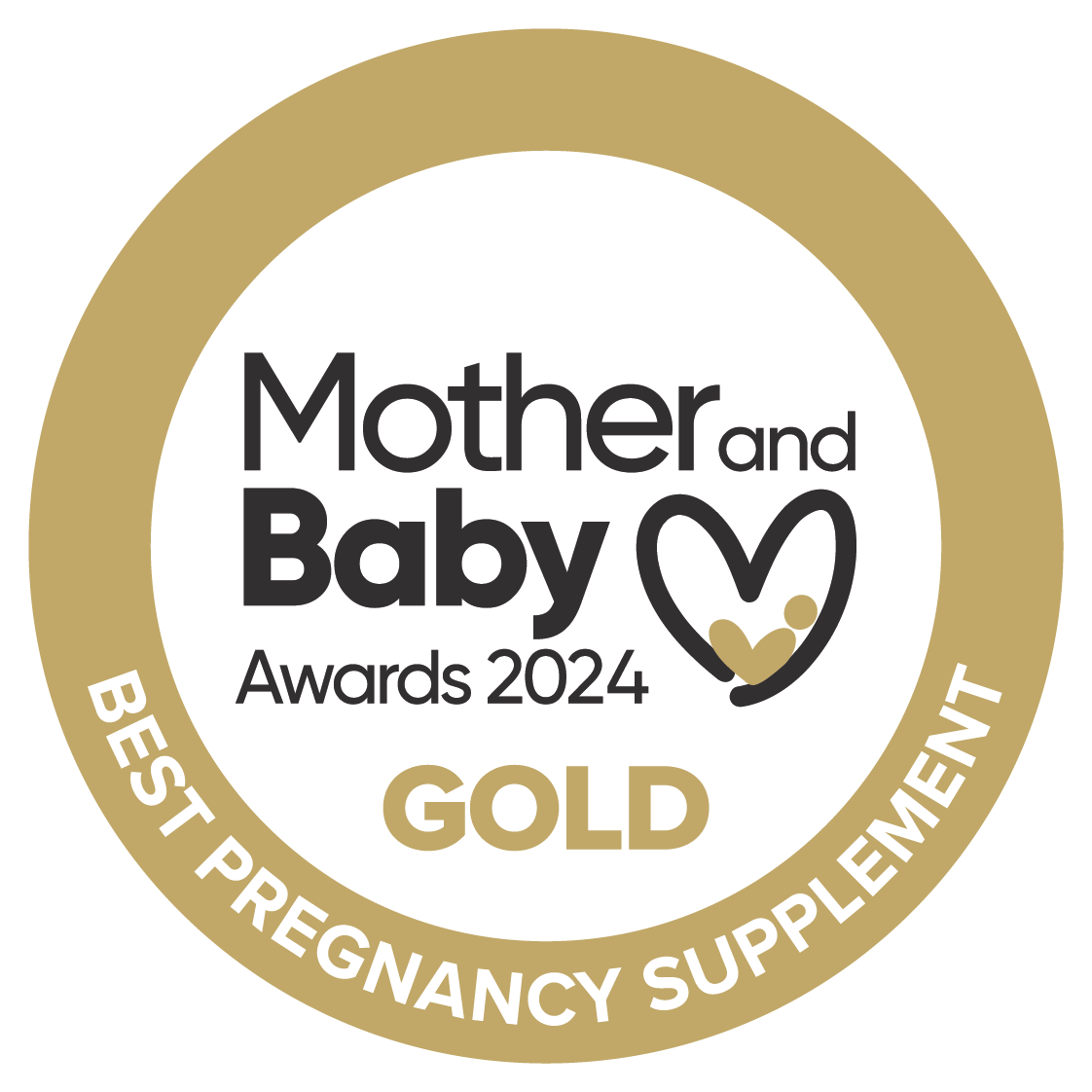IMPRYL® belongs to the category of OTC products and is addressed to women with primary ovation insufficiency and poor responders.
Its innovative composition of micronutrients, i.e. ingredients completely necessary for the proper functioning of our cells, mimics the action of the Mediterranean diet. Impryl in our body works in the mitochondria, which are the energy factories of cells.
With IMPRYL® we protect the mitochondria of our cells from the high oxidative stress that they themselves produce during their operation while at the same time we provide them with the appropriate substrates so that their operation is uninterrupted in every function of our organisms
IMPRYL® mode
For mitochondria to function smoothly, a balance is needed between three biochemical reactions:
Production of endogenous glutathione: Glutathione is the main antioxidant in our body and helps protect cells from oxidation.
DNA Methylation: This reaction is important for the proper repair and functioning of DNA, our cells’ genetic material.
Recycling of Homocysteine: Homocysteine is an important molecule that contributes to the balance of our body, and its recycling is necessary for our health and fertility.
IMPRYL® helps maintain this balance, allowing mitochondria to function properly.
Power and activation
IMPRYL® is the natural ally in activating the endogenous antioxidant system. Impryl® gives each cell’s mitochondrion the ability to modulate oxidative stress according to the stimulus it receives from the environment, maintaining a balance between inducive and oxidative stress. Unlike antioxidant substances (vitamin C, E, isoflavones, etc.), whose effects are dubious and whose long-term administration may have negative impacts on the cell itself. The patented formula of Impryl® utilizes the benefits of the Mediterranean diet to maintain a better redox balance within the control of natural cellular homeostasis even in long-term administration.
Clinical data
Published data confirm Impryl® as an effective nutritional tool both for improving the quality of oocytes and for reducing the level of homocysteine in the blood.
IMPRYL® has been administered to a fairly large number of women up to the age of 40. In these clinical studies, all the ladies suffered from at least 2 years of infertility. With the administration of only IMPRYL® for 2 months before the start of the in vitro fertilization protocol, there were pregnancies both with the in vitro method and naturally. This proves that if the mitochondria of the oocytes are protected from the high oxidative stress they create, then the risk of aneuploidy is reduced, the maturation of the oocyte is significantly improved, and the chances of achieving pregnancy increase exponentially.
In other clinical studies, the administration of IMPRYL® led to a reduction in homocysteine levels in the serum in all subjects who underwent treatment (response rate 100%) both in young women with polycystic ovary syndrome (Schiuma et al. 2020) and in infertile men (Clement et al 2023). In women undergoing assisted reproduction, it is also possible to measure homocysteine in the follicular fluid to predict their quality. In a controlled study, that was published in 2023, two groups of women aged 37,5 years were compared. All women in common suffered from polycystic ovary syndrome and primary infertility or at least 1 year. One group took Impryl®, one pill a day for 2 months (from the start of the protocol until the time of oocyte retrieval). At the end of the stimulation protocol, to the group of women, who took Impryl, a smaller dose of gonadotropins was administered, there was a double percentage of zygotes that ended up in blastocysts and a double percentage of women who successfully achieved clinical pregnancy, in comparison to the group of women who didn’t take Impryl. And all this, with only 2 months of IMPRYL® therapy (Kucuk et al 2023).
The formula of IMPRYL®
The formula of IMPRYL® is 100% natural and takes full advantage of the benefits of the Mediterranean diet. The substances that make up the patented formula of IMPRYL® are in their active form, that is, they can be directly used by the mitochondria without further processing in the body. For this IMPRYL® is the natural ally in every woman’s effort to live the dream of motherhood.
Dosage
1 Tablet/Day (Take in the morning on an empty stomach)
Recommended duration of treatment:
- For ovarian stimulation: 2 months
- For 1st trimester support: 3 months
- For polycystic ovary syndrome: 6 months
- For polycystic ovary syndrome is recommended co-administration with metformin.
The product is available in all Greek physical or online pharmacies.
The Ministry of Health and the National Medicines Agency recommend:
CONSULT YOUR DOCTOR OR PHARMACIST.
- Do not exceed the recommended daily dose.
- Keep out of the reach of small children.
- Food supplements should not be used as a substitute for a varied and balanced diet and a healthy lifestyle. This product is not intended for the prevention, treatment or cure of human disease.
- Consult your doctor if you are pregnant, breastfeeding, under medication or facing health problems.
Quality & Quantitative Recommendation
IMPRYL® 1300mg, film-coated tablet
Each film-coated tablet contains:
| Composition (recommendation with nutritional/physiological action) | Per daily dose (1 tablet) | % DHW* |
|---|---|---|
| Betaine (trimenthyl glycine) | 200mg | – |
| L- cystine | 200mg | – |
| Niacin | 16mg | 100 |
| Zinc diglycinate | 5mg | 50 |
| Vitamin Β6 | 1,4mg | 100 |
| Riboflavin | 1,4mg | 100 |
| 5MTHF- glucosamine (folic acid) | 400mcg | 200 |
| Methylcavalmin (vitamin B12) | 2,5mg | 100 |
*NDR: Nutritional reference value according to regulation (EU) 1169/2011
**IMPRYL® is gluten free & lactose.
Product notified by National Organization for Medicines (EOF): 104900/4-10-2023
The notification to EOF is not a marketing authorization by EOF.
Bibliography
- Dattilo et al. J. Ass. Reprod. Gen, 2016
- N.Schiuma et al. J. of Endocrinological Investigation, 2019
- Humphrey LL et al. . Mayo Clin Proc 83(11):1203–1212
- Kilicdag et al. Hum Reprod, 2005
- Cornet et al. SAGE Open Med Case Rep, Zhang et al. Nutrients, 2016
- Silvestris et al. BioResearch Open Access, 2017
- Servy et al. J. Ass. Reprod. Gen, 2018
- Erica Silvestris et al. Womens Health Gynecol, 2016
- Kucuk, J.Ass. Reprod. Gen., 2023
- Clement, Front. Reprod. Health 2023

